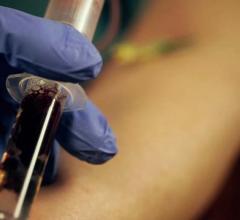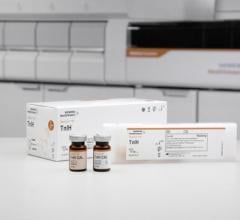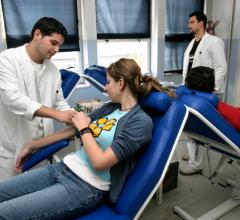March 19, 2013 — Alere Inc. announced the results of research presented at the American College of Cardiology’s 62nd Annual Scientific Session, which showed that a simple screening and management program can be effective in preventing heart failure for at-risk patients.
The five-year STOP-HF study enrolled asymptomatic patients over 40 years of age with risk factors for heart failure and randomized them into intervention and control groups. Patients in the intervention group were screened for blood levels of B-type natriuretic peptide (BNP), a hormone that indicates how well the heart is functioning, using the Alere Triage Meter and, if necessary, received specialized care. Control-group patients continued to receive standard care from their physicians. Researchers found that a significantly lower number of patients in the intervention group than in the control group met the primary endpoint of new onset heart failure requiring hospitalization or left ventricular dysfunction (5.3 vs. 8.7 percent, p = 0.01).
“The results of this study indicated that use of BNP in the community may facilitate prevention strategies aimed at reducing heart failure, left ventricular dysfunction and cardiovascular events,” said Kenneth McDonald, M.D., director of the Heart Failure Unit at St. Vincent’s University Hospital in Dublin and one of the authors on the STOP-HF study. “Our study shows that a simple blood test screening, followed by targeted care of people at heightened risk of heart failure, can result in a dramatic reduction in cardiovascular events. This is good news, since heart failure has become a major public health problem and middle-aged adults today have a 20 to 30 percent lifetime risk of developing heart failure.”
Nearly 6 million Americans have heart failure, a condition in which heart function has deteriorated as a result of various forms of damage, including prior heart attack, chronic high blood pressure, diabetes and obesity. Elevated BNP levels can indicate established heart failure, and healthcare providers use patients’ BNP levels to determine the severity. BNP levels can also, as shown by the STOP-HF study, be used to indicate risk of heart failure and the possible need for more focused intervention.
The STOP-HF study recruited 1,374 patients from 39 family practices. The patients in the intervention arm were screened at least annually for cardiovascular risks and blood levels of BNP. Two in five (41.6 percent) patients in the intervention group showed elevated BNP levels at some point during the study. These patients received an echocardiogram and continued care under both their physicians and a specialist cardiology service. In addition to showing lower rates of the primary endpoint, intervention patients also had lower rates of emergency hospitalization for major cardiovascular events (22.3 vs. 40.4 per 1,000 patient years, p<0.001).
“While we have made great strides in the management of heart failure, outlook for these patients remains poor with reduced longevity and quality of life. The STOP-HF project provides the first example of how a structured screening and intervention strategy can prevent heart failure,” McDonald said.
Most other studies on heart failure have focused on treatment of the established syndrome, and researchers hope the results of this study will encourage healthcare providers to look at prevention while also implementing simple, low-cost screening systems for their at-risk patients.
Researchers recommend that their study population be followed over time to see whether intervention benefits persist, and that the study be repeated in other healthcare systems. They hope to evaluate other potential screening tests to identify additional patients at risk for heart failure.
The STOP-HF study was funded by the Health Services Executive and the Health Research Board of the Irish government, the European Commission Framework Programme 7 Media Project, and the Heartbeat Trust, an independent charity focused on heart failure prevention. The Heartbeat Trust has received unrestricted educational and research grants from Alere, Pfizer, A. Menarini, Roche, Takeda, Abbott, Servier and Merck.
For more information: www.alere.com


 October 09, 2019
October 09, 2019 









